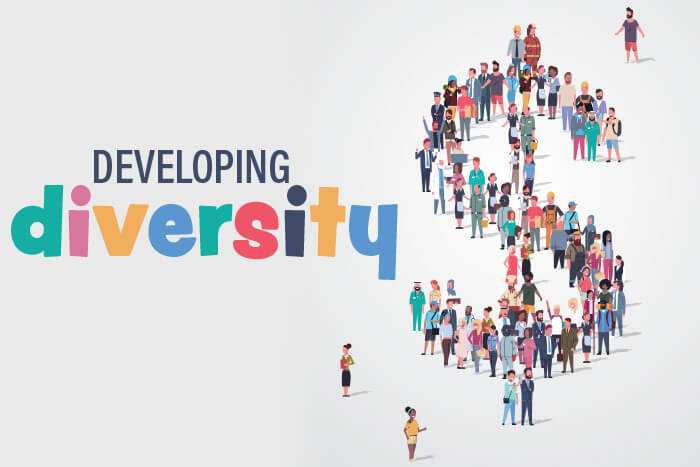Creating solid diversity, equity and inclusion efforts go a long way in developing teamwork, supporting labor issues and improving revenues.
“To be a successful small business in 2023, entrepreneurs must ensure that inclusion is incorporated into every step of their business,” notes Kirk McElwain, acting press director for the U.S. Small Business Administration’s Office of Communications and Public Liaison.
It’s important first to define DEI, says Richard Lehr of Lehr Middlebrooks Vreeland & Thompson, in Birmingham, Alabama.
He works on diversity issues with several companies and industries to help them develop policies and conduct diversity training. He also serves on the National Association of Landscape Professionals’ Diversity and Inclusion Council. DEI in its broadest sense may benefit a landscaping and irrigation team in that with a variety of life experiences, different perspectives may be offered when considering workplace issues and objectives, Lehr says.
“Varying perspectives may contribute to a broader consideration of factors to reach the best overall business decision strategically on how to respond to a particular situation or challenge,” he adds.
There are many ways in which developing DEI efforts can help with labor challenges.
Understanding employees’ unique needs and culture helps small business owners better improve work/life balance and increase productivity for all, says McElwain.
 Groups of individuals in different communities come to work with varied sets of skills, says Wayne Encalarde, principal and CEO of Encalarde Consultants in New Orleans, Louisiana. That’s especially true of markets like landscape irrigation by virtue of the fact that there’s a lower barrier to entry to start earning income. That allows people from any background to be a part of the industry.
Groups of individuals in different communities come to work with varied sets of skills, says Wayne Encalarde, principal and CEO of Encalarde Consultants in New Orleans, Louisiana. That’s especially true of markets like landscape irrigation by virtue of the fact that there’s a lower barrier to entry to start earning income. That allows people from any background to be a part of the industry.
Multiple studies have shown that companies with greater gender and ethnic diversity are more profitable, says Barbara Booth, chair of the Irrigation Association’s Diversity, Equity and Inclusion Task Force and vice president of microirrigation for Rain Bird Corporation, Azusa, California.
“Diverse teams are both more innovative and tend to do a better job of holding each other accountable,” she says. “These behaviors lead to better business outcomes for your employees, your customers and your bottom line.”
DEI helps address labor issues that arise in the workplace as well as adding to diversity and availability of skill set, he says. It also encourages a diversity of thought to have people coming from different backgrounds and different socioeconomic statuses that give them the experience to approach and solve problems in different, innovative ways.
“Innovation is often bred by necessity but also gives competitive advantage,” Encalarde says.
New perspectives
Sal Crespo, ASBC, an accredited small business consultant with Ten2 Consulting in Biloxi, Mississippi, says developing a focus on DEI provides additional perspectives that a single business owner might not have on their own or by working only with people who have a similar background.
“The more diversity you have in a population, the more opportunities you have to draw from that pool and expand your business,” he adds of the benefit of DEI in addressing labor issues.
“I’m from Puerto Rico and I live in the Deep South,” he says. “Believe it or not, we have a ton of diversity. Obviously, having diversity increases the opportunity to dig deeper into the mindset of what each individual brings to the table. The more different types of ideas, the better and the stronger your company will be.”
DEI efforts may contribute to a workplace culture where outcomes include employee retention and employees putting in extra effort in job performance, notes Lehr.
Cherisa Chapa, a process management consultant with Recharge Digital Consultancy in Burkburnett, Texas, notes that developing a company culture that encourages DEI benefits the team in that “everybody knows that they’re part of a team and that regardless of any differences they have – color, race, creed or whatever it may be – that they’re accepted. And when you feel accepted, you’re more a part of a team. If everybody feels a part of the team and appreciated, they’re going to be more apt to work harder.
“If they spot a problem out there with the irrigation system, they’re more apt to say something instead of saying, ‘That’s not my job,’” she points out. “When they feel valued and that their skill set is valued and what they say and do and how they do their job is appreciated, then they’re going to contribute more. They’re going to naturally work harder.
“This is back-breaking labor. They’re going to push through the hard parts or think smarter because then they’re going to care about the company that they feel cared for by,” she says.
When the team works harder together and presents itself as a team to the client base, “that increases the profits because your quality will increase,” Chapa points out.
DEI promotes teambuilding through opportunities to work with people with differences in culture, appearance and ability, such as “folks who may have been previously injured because maybe they’re a veteran or they’ve been injured on a previous job,” notes Encalarde.
“It’s a great exercise in empathy and teambuilding in really having to shore up where maybe their weakness is your strength and vice versa. It brings a stronger sense of camaraderie, but it’s all based off of the organizational culture and the leadership skills of those who manage those folks.”
Payback in profits
Revenues may be improved through DEI efforts, says McElwain. “An engaged and diverse workforce results in optimal individual and organizational performance. It is well known and documented that when you use best practices in diversity, equity and inclusion in every aspect of your business, you can expect continued growth and improved sustainability.”

Building a company with DEI best practices at its core can reduce overall turnover, which is costly, both in the time and money spent and the lost opportunity of hiring and retaining, Lehr points out.
“In a robust, broadly defined DEI culture, there is less siloing, more workforce engagement and a greater sense of ‘oneness’ as an outcome,” he says.
When you have varying perspectives from a multitude of different people who represent diverse groups and ways of thinking, “then you’ll start to get better process improvement, which will drive down margins through efficiency. You’ll start to get access to greater networks,” says Encalarde.
He points out that small business revenues are many times derived from word-of-mouth and performance more than from advertising efforts.
“To have a diverse population of workforce definitely will help to spread the word amongst those different communities,” he says. “If you have great employees from diverse groups and you manage a team well, then they will naturally promote your company and your services because they also see the company as an extension of themselves in that space.”
Among the steps companies can put into practice now to develop DEI efforts include building a coaching and accountability system, notes Chapa.
“You’re going to coach and mentor somebody to develop their skill set and to better their work environment or your work environment,” she adds. “Accountability is a part of it. When you develop that type of culture, people will hold their peers accountable.
If there’s a bad apple, it won’t spoil the whole bunch because the person is being held accountable not only by the team but by the business as well, she says. “That person will either have to become more motivated to produce more product or to become more productive, or they will naturally leave.”
One of the best ways to recruit and retain top talent is to eliminate factors from the work environment that make people uncomfortable or unwelcome, says Booth.
“Proactively developing a diverse team will help attract a broader talent pool,” she says. “If you make an effort to cultivate a productive and inclusive work environment, you will attract the best people and keep them from going to your competitors.”
For those who can, becoming certified as a minority or disadvantaged business can help “because that way you can be included into the supply chain of major capital projects happening in your area from a municipal or state level,” says Encalarde. “There’s also a lot of federal opportunities for small businesses through organizations like Department of Transportation and Development.”
Lehr points out that practices contractors can put into place to begin developing DEI efforts include
- acknowledging dates of historical significance and use those dates to reinforce organizational values, such as discussing Martin Luther King, Jr. Day or Juneteenth.
- demonstrating appreciation for differences in national cultures, including sports, food and music, given employees in the industry often are from other countries, whether through the H-2B nonagricultural visa program or otherwise.
- recruiting at historically Black colleges and universities where relevant. “For example, if recruiting agronomy majors from Auburn, consider also recruiting such majors from Alabama A&M,” he says.
- training supervisors, managers and all employees on acceptable and unacceptable behavior, including what’s posted on social media.
“Successful DEI does not treat DEI as the historically oppressed and oppressors,” notes Lehr. “Rather, it’s a commitment to an open-minded and welcoming culture that respects and celebrates differences.”





